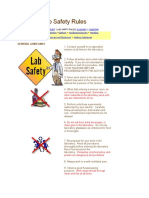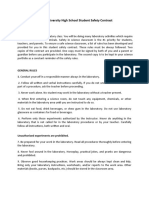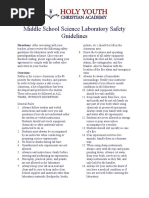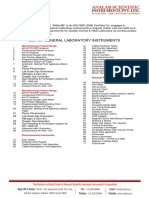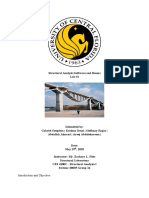0 ratings0% found this document useful (0 votes)
8 viewsLab Safety Rules
Lab Safety Rules
Uploaded by
azuresaphire01LabSafetyRules
Copyright:
© All Rights Reserved
Available Formats
Download as PDF, TXT or read online from Scribd
Lab Safety Rules
Lab Safety Rules
Uploaded by
azuresaphire010 ratings0% found this document useful (0 votes)
8 views2 pagesLabSafetyRules
Original Title
LabSafetyRules
Copyright
© © All Rights Reserved
Available Formats
PDF, TXT or read online from Scribd
Share this document
Did you find this document useful?
Is this content inappropriate?
LabSafetyRules
Copyright:
© All Rights Reserved
Available Formats
Download as PDF, TXT or read online from Scribd
Download as pdf or txt
0 ratings0% found this document useful (0 votes)
8 views2 pagesLab Safety Rules
Lab Safety Rules
Uploaded by
azuresaphire01LabSafetyRules
Copyright:
© All Rights Reserved
Available Formats
Download as PDF, TXT or read online from Scribd
Download as pdf or txt
You are on page 1of 2
LAB SAFETY RULES - CHEMISTRY 20
1. Contact lenses may not be worn in the laboratory
2. Conduct yourself in a responsible manner at all time
in the laboratory
3. Follow all written and verbal instructions carefully. If
you do not understand a direction or part of a
procedure, ASK YOUR TEACHER BEFORE
PROCEEDING WITH THE ACTIVITY
4. Never work alone in the laboratory. No student may
work in the science classroom without the presence
of the teacher
5. When fist entering a science room, do not touch any
equipment, chemicals, or other materials in the lab
area until you are instructed to do so.
6. Perform only those experiments authorized by your
teacher. Carefully follow all instruction, both written and oral. Unauthorized experiments are not
allowed.
7.Be prepared for your work in the lab. Read all
procedures thoroughly before entering the lab. Never
fool around in the lab. HORSEPLAY, PRACTICAL
JOKES, and PRANK are DANGEROUS and
PROHIBITED.
8.Always work in a well ventilated area.
9.Be alert and proceed with caution at all times in the
Lab. Notify the teacher immediately of any unsafe
conditions you observe
10.Labels and equipment instructions must be read
carefully before use. Set up and use of the equipment
as directed
by your
teacher.
11.Experiments must be personally monitored at all times.
Do not wander around the room, distract other students,
startle other students or interfere with the laboratory
experiments of others
12.Know the locations and operating procedures of all
safety equipment including first aid kits, fire
extinguisher, emergency wash stations etc.
13.Never handle broken glass with your bare hands. Use a
brush and dustpan to clean up broken glass. Place
broken glass in the designated glass container.
14.Dispose of all chemical waste properly. NEVER mix
chemicals in sink drains. Sinks are to be used only for
water. Check with your teacher for disposal of
chemicals and solutions
15.Report any accidents (Spills, breakages, etc) or
injuries (cut, burn, etc) to the teacher
immediately, no matter how trivial it seems. DO
NOT PANIC
16.If you or your lab partner is hurt immediately
(AND LOUDLY) yell out the teacher’s name to
get the teachers attention. DO NOT PANIC
17.If a chemical should splash in your eye(s) or on
your skin, immediately flush with running water
for at least 20 minutes. Immediately (AND
LOUDLY) yell out the teachers name to get the
teachers attention.
18.Know what to do if there is a fire drill during a
laboratory period; containers must be closed, and any electrical and gas equipment turned off.
19.Observe good housekeeping practices. Work areas should be kept clean and tidy at all time.
20.Do not eat food, drink beverages, or chew gum in the laboratory. Do not use laboratory glassware
as containers for food or beverages.
21.Any time chemicals, heat or glassware are used, students will wear safety goggles. NO
EXCEPTIONS TO THIS RULE
22.A lab coat or smock should be worn during laboratory experiments
23.Dress properly during a laboratory activity. Long hair, dangling jewelry and loose or baggy
clothing are a hazard in the laboratory. Long hair must be tied back, and dangling jewelry and
baggy cloths must be secured. Shoes must be complexity covering the foot. No Sandals allowed on
lab days.
24.Keep hands away form face, eyes, mouth and body while using chemicals or lab equipment. Wash
your hands with soap and water after performing all experiments
25.All chemicals in the laboratory are to be considered dangerous. Avoid handling chemicals with
fingers. Always use tweezers. When making an observation, keep at least 1 foot from the specimen.
Do not taste, or smell any chemicals. Check the label on all chemical bottles twice before
removing any of the contents. Take only as much chemical as you need
26.If a spill occurs clean it up immediately. For an acid or base spill neutralize it first (ie use Sodium
Bicarbonate or “Baking Soda”) before you mop it up.
27.Any potentially dangerous gases or those which could cause
explosion or fire need to be conducted in a fume Hood.
28.Never return unused chemicals to their original container. Never
remove chemicals or other materials form the laboratory area.
29.Examine glassware before each use. Never use chipped, cracked,
or dirty glassware.
30.If you do not understand how to use a piece of equipment, ASK
THE TEACHER FOR HELP!
31.Do not immerse hot glassware in cold water. THe glassware may
shatter.
You might also like
- CL-1000i&1200i - Service Manual - V5.0 - ENDocument781 pagesCL-1000i&1200i - Service Manual - V5.0 - ENĐỗ Nam100% (10)
- URS - CentrifugeDocument5 pagesURS - CentrifugeHưng Lữ Nguyễn Phúc75% (4)
- CL 2000i 2200iDocument881 pagesCL 2000i 2200iAnonymous GhWU5YK8100% (4)
- Student Lab Safety Contract: Mrs. Rohde's 9 Grade Earth Science Class PurposeDocument1 pageStudent Lab Safety Contract: Mrs. Rohde's 9 Grade Earth Science Class Purposeapi-326700987No ratings yet
- lab safety rulesDocument4 pageslab safety rulesMelva GuerraNo ratings yet
- ACFrOgDyo25KajqguZRWM9gLBqgupGef6HdHCB06fquG6tkAcsmISOoryHJNAYG Ybb7vnR-Xwk2e JkGDS05m-NyqnPkM1JWn2Uhj0zXZqO1IW2Nru Otf9HvHzWE9HMRqD4Z0WoEvP6WTOcPgTDocument2 pagesACFrOgDyo25KajqguZRWM9gLBqgupGef6HdHCB06fquG6tkAcsmISOoryHJNAYG Ybb7vnR-Xwk2e JkGDS05m-NyqnPkM1JWn2Uhj0zXZqO1IW2Nru Otf9HvHzWE9HMRqD4Z0WoEvP6WTOcPgTArmanie Guzman-DircioNo ratings yet
- Lab Safety RulesDocument10 pagesLab Safety Rulesrhomelyn malanaNo ratings yet
- Labrules 1Document1 pageLabrules 1charbel Abou MarounNo ratings yet
- Physics Student Safety ContractDocument3 pagesPhysics Student Safety ContractJdeen FajardoNo ratings yet
- Activity No. 1 - Laboratory Safety and Preventive MeasuresDocument3 pagesActivity No. 1 - Laboratory Safety and Preventive MeasuresVincent DayangcoNo ratings yet
- Science Lab RulesDocument6 pagesScience Lab RulesMalati PalanisamyNo ratings yet
- Practical Guide Biology 1Document83 pagesPractical Guide Biology 1Siyabonga MasukuNo ratings yet
- Laboratory Safety RulesDocument19 pagesLaboratory Safety RulesEpoditmas SeyerNo ratings yet
- Chem+0 1+Student+Safety+ContractDocument2 pagesChem+0 1+Student+Safety+Contractjosephhuelskamp469No ratings yet
- Kami Exporr afety Contract Science OPRF (1)Document3 pagesKami Exporr afety Contract Science OPRF (1)zvaldez01No ratings yet
- LAB SafetyDocument4 pagesLAB SafetyEesha DaveNo ratings yet
- Laboratory Safety RulesDocument3 pagesLaboratory Safety RulesHyudgeNo ratings yet
- Sfhs Safety AcknowledgementDocument2 pagesSfhs Safety Acknowledgementapi-356101386No ratings yet
- Lab Safety RulesDocument3 pagesLab Safety Rulesnoel0880lopezNo ratings yet
- BIOLOGY LAB SAFETY 1aDocument10 pagesBIOLOGY LAB SAFETY 1amusondachansa16No ratings yet
- Scientific Method Lab 1Document25 pagesScientific Method Lab 1hubercoelloNo ratings yet
- Activity NoDocument9 pagesActivity NoVincent DayangcoNo ratings yet
- Introductory Handout Package - Grade 11 IbDocument40 pagesIntroductory Handout Package - Grade 11 Ibasmaarsalan756No ratings yet
- 0-1-Lab Safety ContractDocument2 pages0-1-Lab Safety ContractIvy Rose PanganodNo ratings yet
- ololstudent_saftey_contractDocument4 pagesololstudent_saftey_contractChristine Oloroso PaulinoNo ratings yet
- Flinn Safety ContractDocument2 pagesFlinn Safety Contractapi-262405485No ratings yet
- Laboratory Safety ContractDocument6 pagesLaboratory Safety Contractwebster gloriagmcNo ratings yet
- Lab Safety ContractDocument2 pagesLab Safety Contractlovesara2345.5No ratings yet
- Lab Manual 2016 (Analytical and Organic Chemistry)Document30 pagesLab Manual 2016 (Analytical and Organic Chemistry)Arif HilmiNo ratings yet
- 01 Gen Chem Safety and Laboratory RulesDocument3 pages01 Gen Chem Safety and Laboratory RulesElla CaparasNo ratings yet
- Biology Safety Contract 1 1Document4 pagesBiology Safety Contract 1 1Isaac HongNo ratings yet
- Middle School Science Laboratory Safety GuidelinesDocument3 pagesMiddle School Science Laboratory Safety Guidelinesapi-277480617No ratings yet
- 41 Commandments Inside The ScilabDocument3 pages41 Commandments Inside The ScilabAlexie AlmohallasNo ratings yet
- 2020-2021 Safety in The Chemistry Laboratory RulesDocument6 pages2020-2021 Safety in The Chemistry Laboratory RulesAnthony MerleNo ratings yet
- null 3Document2 pagesnull 3anasalsunwiNo ratings yet
- Lab Safety GuidelinesDocument1 pageLab Safety GuidelinesLow Ban HengNo ratings yet
- Safety Rules ContractDocument4 pagesSafety Rules Contractapi-293174360No ratings yet
- CFP 00105 CHEMISTRY 1 - Laboratory Manual UNIKLDocument21 pagesCFP 00105 CHEMISTRY 1 - Laboratory Manual UNIKLIrham SyahmiNo ratings yet
- Laboratory Safety Rules and GuidelinesDocument4 pagesLaboratory Safety Rules and GuidelinesAileene MontenegroNo ratings yet
- Safety Precautions Inside The LaboratoryDocument5 pagesSafety Precautions Inside The LaboratoryDr. Navya Pakalapati100% (1)
- Science Safety ContractDocument14 pagesScience Safety ContractBrian MurtaghNo ratings yet
- Expt 1 Lab Safety and Equipment SEDocument12 pagesExpt 1 Lab Safety and Equipment SEFrance AldaveNo ratings yet
- Student Lab Safety Contract: PurposeDocument3 pagesStudent Lab Safety Contract: Purposeapi-342311816No ratings yet
- Chemical Engineering Laboratory 1 Lab Ma PDFDocument49 pagesChemical Engineering Laboratory 1 Lab Ma PDFvenkieeNo ratings yet
- Laboratory Safety Rules and ContractDocument2 pagesLaboratory Safety Rules and Contractzpn9yj94j2No ratings yet
- Safety ContractDocument2 pagesSafety Contractapi-236865387No ratings yet
- Biology Lab Safety Contract: Their Copy. Please Read The Entire Contract Before You Sign. Students Will Not Be AllowedDocument4 pagesBiology Lab Safety Contract: Their Copy. Please Read The Entire Contract Before You Sign. Students Will Not Be Allowedapi-297284721100% (1)
- Chemistry Lab Rules General SafetyDocument2 pagesChemistry Lab Rules General Safetypilar0218No ratings yet
- 1_Lab Safety_RulesParentDocument2 pages1_Lab Safety_RulesParentalyssa.mammenNo ratings yet
- Cerritos - Safety - in - The - Chem - Lab - June 11 - 09Document8 pagesCerritos - Safety - in - The - Chem - Lab - June 11 - 09dariya.makhmutovaNo ratings yet
- Student Lab Safety Contract: Mrs. Rohde's 8 Grade Science Class PurposeDocument1 pageStudent Lab Safety Contract: Mrs. Rohde's 8 Grade Science Class Purposeapi-326700987No ratings yet
- LABORATORY GUIDELINESDocument12 pagesLABORATORY GUIDELINEStjbalagtas8No ratings yet
- Lab Safety RulesDocument6 pagesLab Safety RulesnettextsNo ratings yet
- Laboratory Rules and RegulationsDocument1 pageLaboratory Rules and RegulationsLadema KaranjaNo ratings yet
- Lab Safety RulesDocument2 pagesLab Safety RulesforeverjoyfulNo ratings yet
- Flinn Scientific LAB Safety ContractDocument2 pagesFlinn Scientific LAB Safety Contractusmurali2238No ratings yet
- Untitled DocumentDocument6 pagesUntitled Documentpgnavarro4133pamNo ratings yet
- General Safety RulesDocument1 pageGeneral Safety RulesWNo ratings yet
- General Laboratory Safety RulesDocument1 pageGeneral Laboratory Safety Rulespatelaarav920No ratings yet
- Lessons in Science Safety with Max Axiom Super Scientist: 4D An Augmented Reading Science ExperienceFrom EverandLessons in Science Safety with Max Axiom Super Scientist: 4D An Augmented Reading Science ExperienceRating: 4 out of 5 stars4/5 (1)
- Mad Professor: Concoct Extremely Weird Science Projects—Robot Food, Saucer Slime, Martian Volcanoes, and MoreFrom EverandMad Professor: Concoct Extremely Weird Science Projects—Robot Food, Saucer Slime, Martian Volcanoes, and MoreRating: 4 out of 5 stars4/5 (1)
- CE-365-01 F2017 Environmental Engineering Lab 9069 PDFDocument3 pagesCE-365-01 F2017 Environmental Engineering Lab 9069 PDFHayden Chappelear-RobbinsNo ratings yet
- Vet Assisting Program CurriculumDocument31 pagesVet Assisting Program Curriculumjmoyeatt.netNo ratings yet
- AP Physics Inquiry Based Lab ManualDocument334 pagesAP Physics Inquiry Based Lab ManualPoon Yin KwongNo ratings yet
- Bachelor of Science in Chemical Engineering 2014Document6 pagesBachelor of Science in Chemical Engineering 2014Evan DulayNo ratings yet
- Lecture 1 - Laboratory Management and BiosafetyDocument107 pagesLecture 1 - Laboratory Management and BiosafetyRudairoNo ratings yet
- Project Proposal For The Establishment of An Agro-Industrial Laboratory in Faculty of EngineeringDocument8 pagesProject Proposal For The Establishment of An Agro-Industrial Laboratory in Faculty of Engineeringmehedibinmohammad mohammadNo ratings yet
- The Rockefeller Foundation and The League of Nations: Cooperation in International HealthDocument20 pagesThe Rockefeller Foundation and The League of Nations: Cooperation in International HealthAtish KissoonNo ratings yet
- Advertisement Draft For News PaperDocument14 pagesAdvertisement Draft For News PaperLokeshNo ratings yet
- Magnaflux UnitDocument28 pagesMagnaflux UnithamedmosadeqNo ratings yet
- Pathology Quality ManualDocument82 pagesPathology Quality ManualAdriana Gabriela Ugarte MacíasNo ratings yet
- Safety Tutorial CB310 March 2020Document40 pagesSafety Tutorial CB310 March 2020b97hdr6vp2No ratings yet
- EXPERIMENTAL LABORATORY MANUAL by Discip PDFDocument163 pagesEXPERIMENTAL LABORATORY MANUAL by Discip PDFAbelNo ratings yet
- Analab Product ListDocument1 pageAnalab Product Listharsh421No ratings yet
- LyraDocument3 pagesLyraHemanthNo ratings yet
- The Quality Control SystemDocument5 pagesThe Quality Control SystemDIANA LAURA GALLEGOS CABRALNo ratings yet
- Lab Brick Report UthmDocument18 pagesLab Brick Report UthmZahidahNo ratings yet
- Green Audit Online Survey - PPTDocument24 pagesGreen Audit Online Survey - PPTChinmay SolatNo ratings yet
- David Sloss ResumeDocument2 pagesDavid Sloss Resumeapi-354967064No ratings yet
- Field Study 1 (Finale)Document195 pagesField Study 1 (Finale)Bryan Bautista Bago100% (3)
- Surrogate TestingDocument7 pagesSurrogate Testingnavas1972No ratings yet
- Documented Internal QadDocument4 pagesDocumented Internal QadQUINCYNo ratings yet
- Astm D5373-02Document1 pageAstm D5373-02Sylab InstrumentsNo ratings yet
- Work Accident Risk Analysis in The Laboratory of PT. X With FMEA MethodDocument7 pagesWork Accident Risk Analysis in The Laboratory of PT. X With FMEA MethodInternational Journal of Innovative Science and Research Technology100% (1)
- Structural Lab 1Document21 pagesStructural Lab 1Stefhany RapioNo ratings yet
- Manual Arco GarrettDocument60 pagesManual Arco Garrettnicoss69No ratings yet
- Ethiopian Higher Education Undergraduate Students Guide.21Document116 pagesEthiopian Higher Education Undergraduate Students Guide.21kirosnahom08No ratings yet
- Softening & BitumenDocument6 pagesSoftening & Bitumen2020890244No ratings yet






